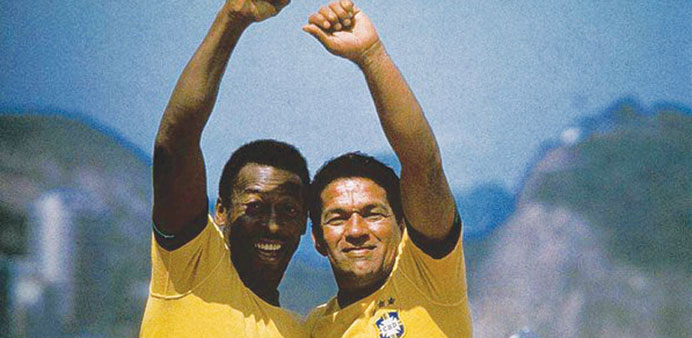|
|
“On what planet was Garrincha born? On a small planet called Pau Grande”, it says at the tiny memorial to the great former Brazilian international beside the pitch where he started his career.
The sleepy neighbourhood in the municipality of Magé lies halfway between Rio de Janeiro and the Brazil team’s training base in Teresopolis.
Turning off the motorway, the road goes through town towards steeply rising mountains covered in lush rainforest until you come to Pau Grande.
It is a modest community and, coming from affluent Teresopolis, the relative poverty is striking, but it is where Garrincha was born and where he was laid to rest.
Born in 1933, Garrincha was a senior colleague of Pele’s in the first Brazil team to win the World Cup, in Sweden in 1958, and with Pele injured, he was the undisputed star of the 1962 side that retained the title.
A great dribbler, Garrincha also featured at the 1966 finals in England and is a legend at Rio club Botafogo. And the National Stadium in Brasilia, where Brazil face Cameroon on Monday, is named after him, not Pele.
Because he was born with a left leg that bent out and a right leg that bent inwards, he was known as The Angel with Bent Legs.
But his barely noticeable tombstone in the rundown cemetery in Raiz da Serra, along the road from Pau Grande, describes him as The Joy of the People.
While Pele is still fighting fit in his 70s, Garrincha died aged 49 in 1983 after being plagued by alcohol and money problems in later life.
Now, the members of his family who remain in Pau Grande feel he is taken for granted.
“In Brazil people who were important in the past are quickly forgotten,” his granddaughter Alexsandra dos Santos, 41, tells AFP.
“Pele is the King but there doesn’t have to be only one. You can have two. My grandfather was not attracted by money. He didn’t place much importance on it. He was a man of the people.”
The house where Garrincha lived as a boy stands out from all those around it. Its walls are painted yellow and inside is a small bar called Garrinchinha dedicated to the player’s memory.
Alexsandra lives there, around the corner from the football ground and the factory where Garrincha used to work. Pau Grande should be eternally proud of its most famous son, but Alexsandra’s tale suggests otherwise.
Garrincha left behind 14 children from different relationships, but no financial legacy.
As the local community showed little interest in supporting a tribute to Garrincha, Alexsandra explains that the bar was built thanks to the help of a reality television show.
“The house was given to Garrincha in 1958 by the local factory as a prize for winning the World Cup but later they asked to give it back before we finally reached an agreement,” she said.
“The show paid for the bar and everything in it. But it’s not enough. I struggle to maintain it.”
Now she would rather sell the bar to raise funds—her asking price is 650,000 reais ($292,000).
In her words, Garrincha was a “shy, awkward” man. He signed blank contracts and ended up one of Botafogo’s poorest paid players.
His family have fought to ensure that he is remembered locally, and there is a small monument to Garrincha by the bus terminal which was erected in 1992.

